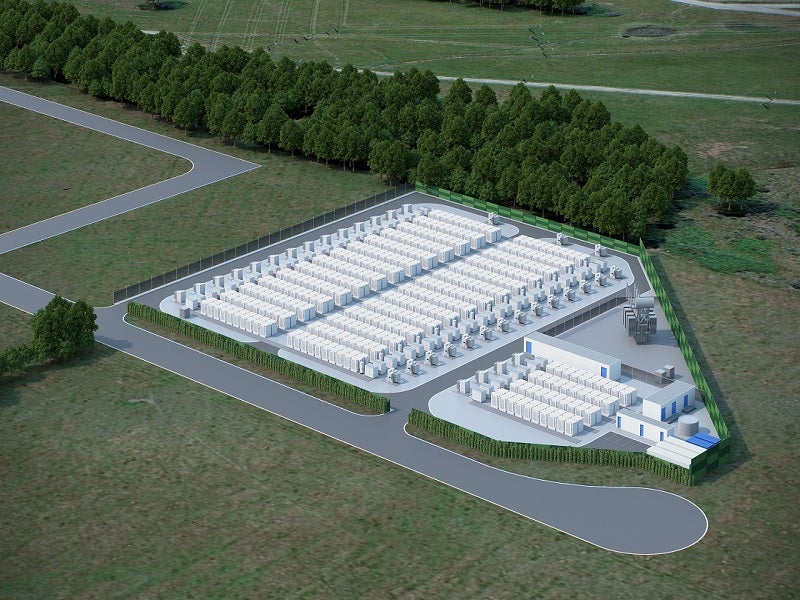The 200MW/400MWh Rangebank battery energy storage system (BESS) is an energy storage project under construction in Victoria, Australia.
Jointly developed by Eku Energy and Shell Energy, with Perfection Private as a minority equity partner, the project reached financial close in March 2023.
Preconstruction activities began in July of the same year, with an official sod-turning ceremony.
Commercial operations are expected to commence in late 2024. Shell Energy will have access to the battery’s entire offtake for 20 years.
Once operational, the Rangebank BESS will have the capacity to power 80,000 Victorian homes for one hour during peak times, which is equivalent to supplying five hours of energy to 31,000 households in Cranbourne.
The project will help Victoria meet its energy storage targets of 2.6GW by 2030 and 6.3GW by 2035, aiding the state’s decarbonisation efforts.
Project location
The Rangebank BESS is being constructed on 2ha of land within the Rangebank Business Park at 280S Evans Road, Cranbourne West, Victoria.
The BESS site is located in the southeast quadrant of the 20ha property, for which a two-lot subdivision has been approved.
Rangebank BESS project details
The Rangebank BESS will deliver 200MW/400MWh of dispatchable power over two hours using Fluence Energy’s Gridstack™ grid-scale energy storage system.
The BESS features a modular design, consisting of an array of equipment that includes batteries, core transformers, inverters, and a large transformer.
Additionally, there will be several small service buildings situated at the centre of the site.
The battery storage units will be configured within a series of rows, with each row containing the cube storage units, light poles, and an inverter.
A core transformer will be located at the end of each row. The battery cube storage units will be 2.5m high and contain lithium batteries.
The battery cubes, inverters and transformers will be mounted on strip footings with the surrounding area comprising gravel hardstands and generally contained within gravel accessways.
The battery is proposed to operate autonomously, 24 hours a day, seven days a week but with regular supervision.
Storage technology
Fluence Energy’s Gridstack system provides a rated AC power from 2MW to more than 500MW, with discharge durations ranging from one to more than six hours.
Gridstack is compatible with both 50Hz and 60Hz grid frequencies.
The system comprises the Fluence Cube, an IP55-rated air or liquid-cooled storage system with lithium-ion sealed cells, which offers integrated control and visibility.
It supports supervisory control and data acquisition and energy management system integration, including distributed network protocol 3 and Native Modbus TCP/IP.
Safety features of the Gridstack system include a fast-stop, fire detection and suppression, gas detection, deflagration panels, and a lockable disconnect switch.
Grid connection for Rangebank battery energy storage system project
The Ragebank BESS project will be connected to Victoria’s transmission network via the adjacent Cranbourne Terminal Station, which is operated by Australian energy delivery services company, AusNet.
Power will be diverted using an underground cable system to 220kV connection equipment located within the Cranbourne Terminal Station.
Project financing
BNP Paribas, Societe Generale’s Sydney Branch, Standard Chartered Bank’s Australia Branch, Sumitomo Mitsui Banking Corporation, and Westpac Banking Corporation have financed the project.
Westpac led the financing, with Herbert Smith Freehills as legal adviser and Macquarie Capital as adviser to Green Investment Group (GIG).
Ashurst was GIG’s legal adviser, and Societe Generale served as the financial adviser.
Contractors involved
Fluence Energy, a global provider of energy storage products and services and cloud-based software, was contracted to supply the energy storage technology and handle construction, servicing, and maintenance for the project in April 2023.
Engineering and construction company, RJE Global leads construction, with Symal, a civil construction company, handling the installation of concrete slabs for the battery units.
Engineering consultant, Aurecon acts as the owner’s engineer, overseeing design review, coordination, and quality control of engineering, construction, inspection, testing, and commissioning.



